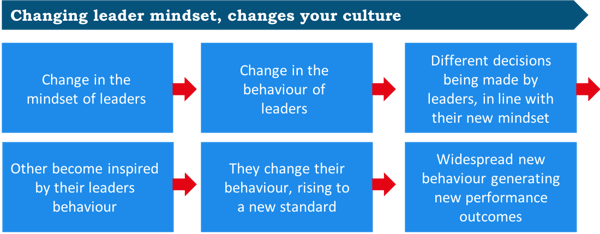The influence of leaders on organisational culture is strong. The shadow that leaders cast into their organisations means that the beliefs and behaviours of leaders permeate deep into the organisation, shaping the culture.
Leaders signal what is valued in an organisation through how they interact with others, how they make decisions, how they use their time and the language that they use. Meetings, presentations, ‘in the corridor’ interactions and the grapevine inform people about what a leader values and therefore culturally the sort of behaviour that is appropriate.
In our experience, the patterns of behaviour (culture) that are present in an organisation are reflective of the collective beliefs and behaviours of leaders in the organisation.
It is for this reason that a focus on shifting leader behaviour during culture transformation is critical. In our experience, any successful culture transformation has a behaviour programme with leaders in year one. Where this does not happen there are two consequences:
The goal from our perspective is to develop leaders as role models. A role model is someone that so strongly demonstrates a way of doing something that others are motivated to follow them and to change their behaviour accordingly.

But how do you do this? In our experience there are a number of factors that enable leaders to become role models:
In my experience the insight that happens most often is where people recognise that although they want to display a behaviour (“I think collaboration is important”) their day-to-day behaviour does not consistently reflect this (“I never spend any time collaborating; I dismiss ideas from others; I tend to make all the decisions”). Where this is the insight, the focus is helping the leader become much more congruent between beliefs and behaviours.
Where a leader’s belief system is at odds with the target culture (“collaboration slows us down”; “I know best”; “I can’t trust anyone else to deliver”) but they see the value and need to change, there is a much greater need for coaching and advisory to unpack the beliefs and help reframe those.
The other group of people you identify in this transformational stage are those that are already role models and these people are critical for your change as they offer a practical view to others about what is possible and the advantage of engaging in the new behaviour. We run a powerful role modelling workshop where we consistently receive the feedback ‘ahh, I see why this is important and what I could do’.
I am often asked ‘what do we do with the person who just doesn’t want to change’. In my experience some of the people who have been identified as ‘never will change’ often have the greatest epiphanies and become extraordinary advocates for the change. This epiphany is often a combination of insight and peer pressure (as other peers start to change the individual becomes more and more uncomfortable staying in the old way). My advice is this, suspend your judgement and give people a chance to change. At the end of 6 months you will know those that will not and wilfully choose not to change; those that are struggling to change but making an effort and those that are starting to become your role models.

Head Office / Europe:
+31 (0) 20 240 2233
North America:
+1 (0) 212 417 0221
UK: +44 (0) 207 100 6999
Asia Pacific: +61 (2) 8310 5285
Brazil & Latin America: +55 (11) 932 500 683
(WhatsApp available)